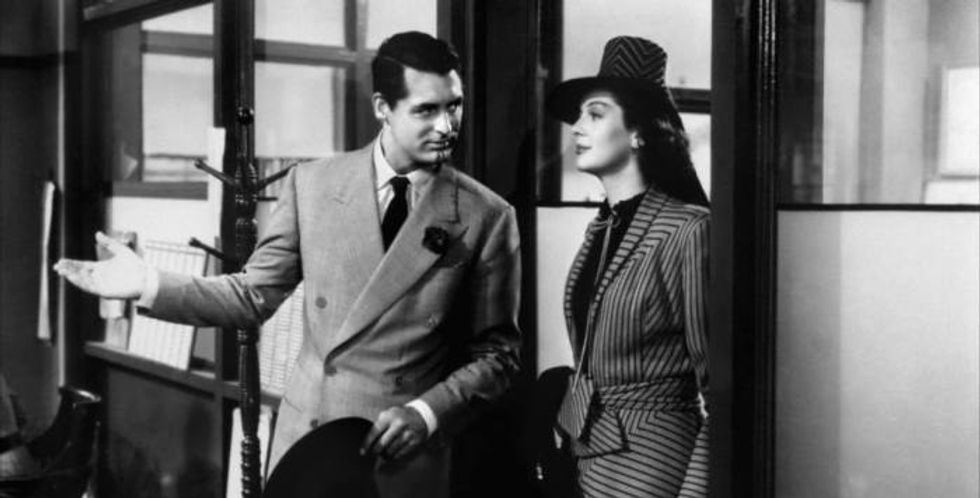I grew up in Jacksonville, Florida (yes, we're close enough to Georgia to be considered Deep South), which means I grew up in a culture of Southern manners, if not Southern accents. From a young age, Southern men are taught to always -- and I mean always -- hold the door open for a lady and let her pass first out of courtesy. Failing to do so is so rude most Southerners find the idea unthinkable.One day, some friends and I were walking into a Barnes and Noble and the woman entering the store ahead of us turned to her 5-year-old son and said "OK, now hold the door for the ladies." The little boy grabbed that handle and leaned his body against the weight of the solid wood door so we could walk through.
This manners system is programmed into our brains. In formal settings, men stand when a woman enters or exits a room. When all the chairs are taken, men stand to give women their seat, and young people of both sexes stand to give elderly people their seat. Everyone calls everyone older than them "sir" and "ma'am," and when I see a man get to a door before me, I don't even hesitate: I just thank him and walk right in. It's just how our world works.
And then I moved to Indiana.
Dear, sweet Indiana. An icy world of frozen precipitation, people avoiding eye contact with strangers, and doors literally slamming in my face.
This forced me to take a long, hard look at the culturally instilled behavior I'd always considered polite and correct.
The trick to gender equality is in the name -- equality. This means men and women should be equally courteous to each other.
My Hoosier friends explained that in the north, men face a dilemma when it comes to chivalry. Often when they hold a door open for a woman, they are scolded for implying the woman is too weak to open her own door. If holding the door appears chauvinistic to some and not holding it seems rude to others, how are they supposed to know what to do?
1. Does holding the door open for a woman show of courtesy or disrespect?
Regardless of where you stand on the feminisim-gender equality debate, we can all agree holding the door or giving up a seat helps someone at another person's expense. The door-holder or seat-giver-upper have to care about someone else's comfort more than their own when they extend these kind gestures. If they wanted to be rude or demeaning, they would let the door slam behind them or stay planted in their chair; It's easier on them, and it shows they don't care enough about you to put in minimal effort to make your day easier.
Feminists who are offended when men open doors for them need to understand that men only do this to show respect. It's a kind gesture, and should be taken as one. In fact, I would go so far as to say it is a display of the sacrificial love we are called to show as Christians.
2. Is it hypocritical for a woman to be a feminist and expect men to hold doors and give up their seats?
The trick to gender equality is in the name -- equality.This means men and women should be equally courteous to each other. Whoever gets to the door should open it first, and whoever is sitting should volunteer their chair. Ladies, this means you should open the door if you get there first, and yes, men, it means that you should let them. Don't reach over their head and hold it anyway. Don't stand aside and make a scene. Just say thank you and walk through the door.
3. Which culture is getting it right: the South, or the North?
As much as it pains me to speak badly about my homeland or the snowy Midwestern land I've come to love, neither.
The South is still pushing the extremely one-sided expectation that men should always open doors and give up seats for women and never allow them to return the favor. I said it earlier, and I'll say it again: gender equality requires men and women to be equally courteous to each other (listen closely: that's the sound of generations of Southern grandparents rolling over in their graves).
While I genuinely appreciate these gestures, the good intent behind them tends to fizzle when it becomes an obligation or a matter of pride. If you stubbornly insist on me taking your chair or refuse to let me open a door for you, you're not being polite or chivalrous: you're showing me your action is a product of cultural expectation instead kindness or concern for my comfort. Refusing to let someone do something nice for you is like spitting on their kindness.
The North (and the West, for that matter) is facing an entirely different issue: many Northern young women, in an attempt to stand up for equality, are giving feminism it a bad name. Yes, I went there. Before you freak out and start calling me names, hear me out.
Though I, a Southerner, view door-opening and seat-volunteering as a courteous, polite action, I could see how it could be easily misconstrued into an insult. Don't get upset when a man opens your door, ladies; get upset when he won't let you open a door for him. That's where the misogyny lies.
The chivalrous roots of our Southern traditions need to end, but not at the expense of the manners themselves. Instead of showing equality by not holding doors or giving up chairs for anyone, we should all hold doors and give up chairs for everyone. It's kind, it's helpful, and it's polite. And it goes to show that life is better in the South.























